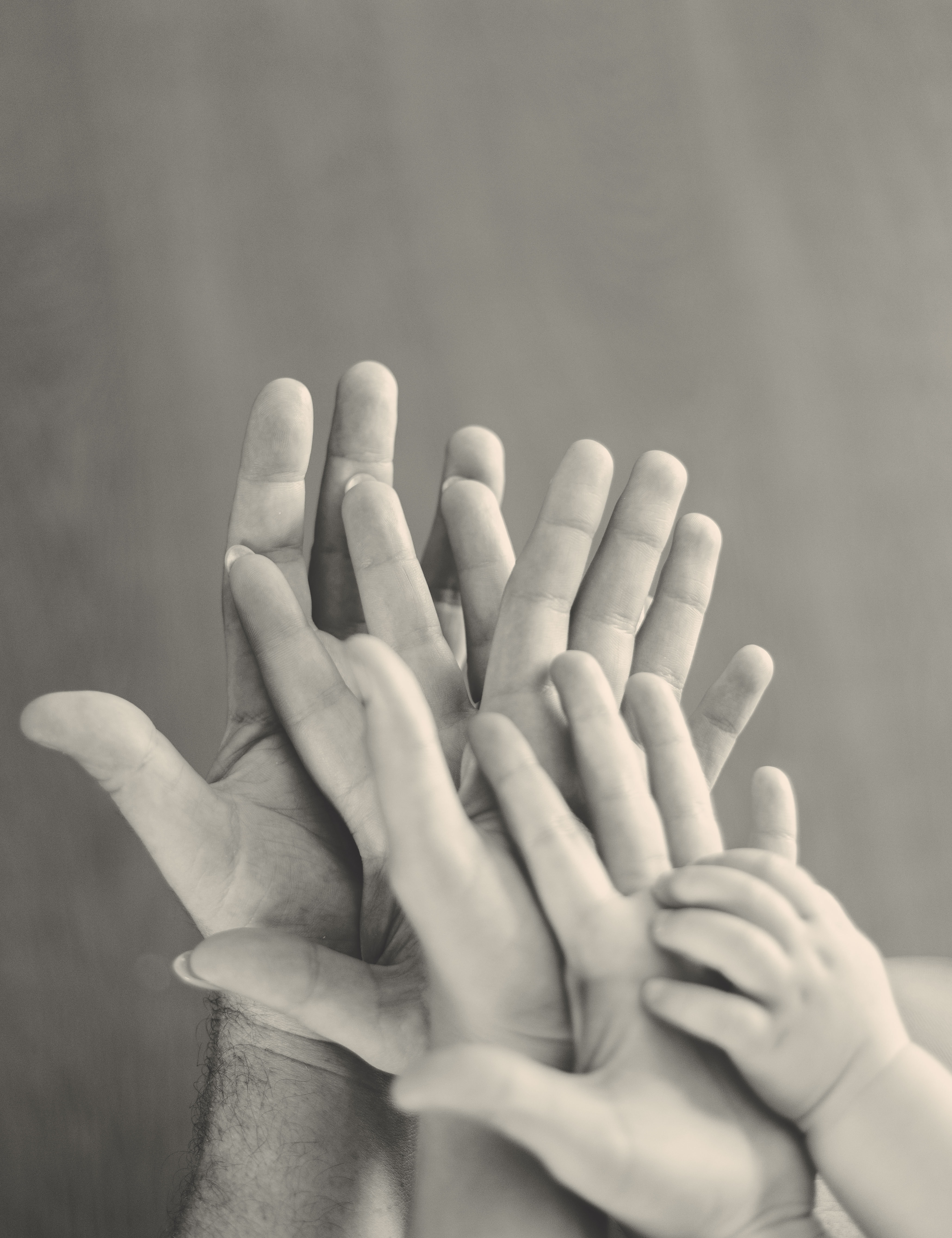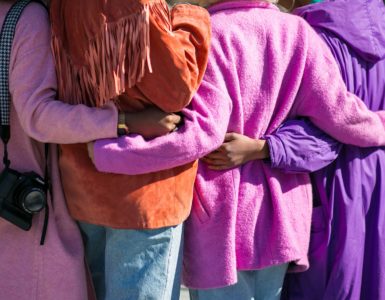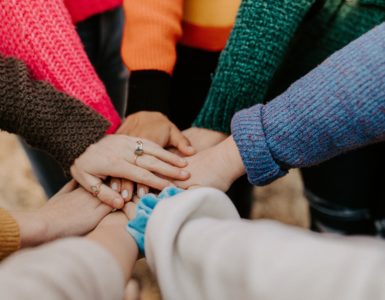Sometimes, we adoptive families are easy to spot. Other times, it would surprise you to find out that not everyone in the family unit is genetically connected. We may be easy to notice for a variety of reasons but I believe that adoptive moms have a sixth sense about who may be another adoptive mom or family. We can easily discern who would understand us, support us, and has walked in our shoes, even among a busy crowd at the local Target. Can you spot other families who are like you? There are some obvious telltale signs that you can figure out by observing or chatting with another family. You might be an adoptive family if…
You cheer for two different countries in the Olympic Games.
My son is from a country in Eastern Europe. When we brought him home, he was three years old (though developmentally below one year old), and we had a two-year-old and six-month-old at home. That first Olympics after having those three babies in our house was so much fun! Our family absolutely cheered for the USA, but those four participants from my son’s birth country got our support, too.
We cheered, checked in on their rankings, and celebrated their victories. We even bought a large American flag to fly out front with a smaller flag of our son’s birth country underneath. If I hadn’t been so exhausted having three kids in diapers, I would have thrown a multinational party, adorned with flag cookies, streamers, and the country’s drink of choice. We love to go all out when it comes to the Olympics and now that we have two countries to cheer for, it’s even more exciting. We cannot wait for the 2020 postponed Olympics to happen!
The members of your family don’t match.
How many adoptive moms have been asked these questions:
“Are they all yours?”
“Are you the nanny?”
“Who is their real mother?”
“Are they siblings?”
“How are they the same age? They look nothing alike!”
The answers always seem to shock our inquisitive minds a bit each time. My son, who is Eastern European, is brown. My other children are white. They look nothing alike and the fact that they are siblings seems to alert the public to an oddity. Family members don’t have to match. Siblings don’t have to look alike. I can promise you, their behavior is very sibling-like! They love, fight, and share everything, just as siblings do. So, you may be an adoptive family if your family doesn’t look like each other. Matching is not a prerequisite to family-hood.
You don’t just fundraise for girl scouts.
Most of my mom-friends fundraise. It seems to be a plight of motherhood that no one tells you about on your first day of being a mom. But, instead of fundraising for their child directly, they fundraise for their daughter’s girl scout troop, their son’s cross country team, their friend’s kid’s cheerleading team, or a local organization they love. Many adoptive mothers have (and many still do) fundraised to bring their child home. Whether you are adopting domestically or internationally, adoption fees add up quickly into the tens of thousands of dollars.
Insurance covers the birth of a child but doesn’t help with the adoption of one. Birthing a child requires OB/midwife costs, hospital/birth center costs, and prenatal and postnatal care. Fees are predictable, most likely reasonable, and go through your insurance company before coming to you with a final cost. Adoption can be unpredictable and the fees astronomical. And the only help you can get is if you are one of the lucky ones to score a grant.
So, many families fundraise to help cover immigration, translation, home study, medical, and travel costs. I fundraised about 80% of our costs for our adoption and I now help others fundraise during their journeys. So, you know you’re an adoptive family if you have stayed up late making crafts to sell, dropped off easter eggs for an easter bunny drop, hosted a spaghetti dinner, gathered items for a silent auction, or baked numerous goods to sell during holidays, all to raise money to help bring your child home.
Now that our son is home and our personal fundraising is done, I now fundraise for others. I do family cross-stitch portraits through my little side business, Stitching Oceans, where 50% of profits go to adoptive families. I also help run a nonprofit, Rainbows From Raya, that provides airplane grants to adoptive families traveling for their pick-up trip. Finally, I help run a matching grant organization, Anonymous Angels, that collectively (and anonymously!) gathers funds for adoptive families adopting special needs children overseas and presents those funds as a matching grant in their last hours of fundraising. Fundraising has become such an integral part of my day-to-day life that I think any adoptive mom could spot me a mile away.
You learned restraint techniques, about hoarding behaviors, self-harm, and triangulation during parenting classes.
During your home study process (and maybe as part of your personal preparation later on), you learn a variety of techniques to help you, as a parent, handle trauma behaviors. Your adopted child will come home with trauma, though the severity and type vary greatly per child and situation. Learning how to cope with those behaviors is imperative to your ability to not only help your child learn to handle their past but also learn how you can handle secondary trauma as a caregiver. Those who give birth to their child do not learn safety precautions before they go home from the hospital. Yet, those who are preparing to adopt a child need to, as much as possible, prepare to bring home a child from hard places. That is a significant difference and one that makes an adoptive family unique.
You have more patience than imaginable.
Although many adoptive parents may verbally negate their personality growth, the truth is, adoptive parents are unbelievably patient. From the start of their journey, they find the patience to wait on organizations, governmental agencies, and applications. Adoptive parents have chosen a path that requires significant and compassionate patience. As they hold their child during a self-harm moment or deal with a difficult IEP meeting at their child’s school (and every moment in between), adoptive parents learn to harness patience from deep within. So, you may be an adoptive parent if you can maintain patience through unimaginable situations. And ones, most likely, only other adoptive parents would understand.
Therapists, of all kinds, are a significant part of your support circle.
When you bring home children from hard places, even if your child was adopted from birth, trauma exists. It is prevalent and can often be a blinding force behind behaviors. Neglect and abuse run rampant throughout adoption stories, so building up a supportive circle is necessary. Having a large community of needed professionals means you are an adoptive family. Constantly reaching out in occupational therapy, speech therapy, physical therapy, talk therapy, music therapy, equine therapy, ABA therapy, etc. can be a significant and telltale part of adoptive parenthood. Adoptive parenting can not be done alone. A support circle is critical to not only your child’s future but to the healing and growth of your mental health.
Your family grew by more than just a child.
Many times, adoption does not mean you add only one (or multiple) child/ren to your family. Adoption can often mean that, along with your child joining your family, your child’s birth family, foster family, or extended caregivers can join your family, too. Even in the case of our son where his birth family is unreachable, we do have a sense of connection to his birth country. I feel very attached to other families that have adopted from my son’s birth country, almost as if they are family as well. So, you may be an adoptive family if you didn’t just grow by a child; you may have grown by a country, too.
You can filter questions from the public without issue.
As we talked about earlier, sometimes the public just needs to ask certain things. You didn’t invite them or even make eye contact, but your family just calls to some people and requires answers. But, as an adoptive parent, filtering these questions become commonplace. You no longer feel the need to explain your child’s behavior to every passerby. Nor tell the backstory of how your family came to be to every inquisitive eye. You learn to cherish and protect your child’s story while doing the same for the ever-changing story of your family unit. Adoptive parents learn quickly how to filter the public so that their child is protected.
Travel and language barriers are no longer an issue. You can cruise through an airport with your eyes closed!
After traveling to Eastern Europe to pick up our son, we became quick experts at traveling international airports with speed and accuracy, despite having a significant language barrier. The art of traveling becomes a necessity while adopting (even if you’re adopting domestically and need to travel through airports in other states). I think adoptive parents could spot other adoptive parents easily in an airport. They’re the parents who are calm despite having to deal with difficult behaviors. They are the parents that have no problem asking for assistance and can easily decipher where to go even though they are obviously foreigners. Adoptive parents, specifically international, know all the good language apps to download to their phones, how to beat a time-sensitive layover without issue, and how to handle a difficult airport with ease.
Love is not defined by blood.
You may be an adoptive family if blood and genetics aren’t a requirement to join your family. Love is an action. Choosing to love those not genetically born to you is a choice adoptive parents make over and over again. We have taught our minds to not need blood relations to make a family and that makes us special. Blood doesn’t define love. Love is a choice and it’s a choice we make every single minute of every day. We, as adoptive parents, have the privilege to raise a child born to someone else. May we never take that for granted and may we always understand the gravity that comes with responsibility. May we always choose love.
Adoptive families have a special bond. We are often the only ones who truly understand each other – the ups, the downs, and all the in-betweens. We understand the sadness, the joy, and how grief can be intertwined with happiness. We understand trauma, secondary trauma, compassion fatigue, and the need for respite care. We understand the need for schedules and the exhaustion that comes with never-ending therapy visits. We understand the trials of being a multiracial/multicultural family and the need to celebrate holidays and Olympic teams that aren’t cheered for here. We see each other, hear each other, and represent each other.
You might be an adoptive family if you can spot another adoptive family in the grocery store and be able to exchange small glances. At that moment, you instantly know that you have a person to help if your child has a trauma moment in the middle of aisle 12. You might be an adoptive family if when you hear another language being yelled during a youth baseball game, your ears perk up. You might be an adoptive family if you drive a really big van to hold all your babies. You might be an adoptive family if the call to the fatherless drove the direction of your family. If you love BIG, you might be an adoptive family.




